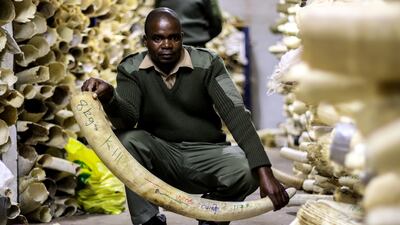Zimbabwe’s battle against the ban on ivory trade is not yet over. It might go ahead and sell its ivory in January next year.
The country has 90 days to enter a reservation against the decision made under Cites – the international treaty drawn up in 1973 to protect wildlife from exploitation – to ban both international and domestic trade in ivory.
Zimbabwe has about 96,000 tonnes of ivory, valued at about $10 billion (Dh36.7bn). It is in desperate need of money as its main sources of income – exports, remittances from its diaspora and foreign investment – are drying up.
Speaking in parliament last week, Zimbabwe’s environment minister, Oppah Muchinguri-Kashiri, said: “I am not going to divulge the position that we are going to take now, because there is a window of 90 days where we are allowed to have reservations.”
A Cites member country entering a reservation against the ban on ivory trade can commercially trade the product to another member that has also entered such reservation. They can do so without violating the provisions of the treaty.
There are indications that Zimbabwe will enter a reservation in January. “We are not tired. We will keep on fighting so that we are not banned from trading in ivory,” said the minister. “The elephants are killing us and we need to be compensated. We will have a serious conflict if nothing is done about it and then we will take it upon ourselves to sell our ivory.”
She also said that the Zimbabwean government policy is that the income from selling elephant tusks should help rural communities to build schools and have access to water.
“When we went to the Cites, we fought very hard because they wanted us to burn our ivory that we have stockpiled and we refused that. The quantities and values that we had placed are very high and we will wait for an opportune time to sell it,” said Mrs Muchinguri-Kashiri.
Zimbabwe also wants trophy hunting of its elephants to continue, as it believes that its elephants are not endangered. Mrs Muchinguri-Kashiri said: “There are certain countries in Africa, such as Botswana, Kenya and Chad that no longer have wild animals and they are pushing for a ban on the sale of ivory. They want Zimbabwe to be banned from selling ivory which it has in abundance.”
Currently, all African elephants are included in Appendix I of the treaty, except for those of Botswana, Namibia, South Africa and Zimbabwe, which are included in Appendix II. However, ivory from these four countries is listed in Appendix I.
Although Zimbabwe can no longer sell its ivory, it has been allowed in the interim to produce ivory artefacts such as earrings and bangles.
However, the environment minister complained: “Whenever tourists come to Zimbabwe, they must have a permit from their countries to import these artefacts. Furthermore, these tourists must apply to the (Zimbabwe) national parks and wildlife management to be able to buy those things.”
Tourists will be reluctant to follow that bureaucratic process just to buy ivory artefacts. That will then result in reduced demand for the artefacts as very few tourists will be able to buy them.
Clemence Machadu is an economist in Harare, Zimbabwe

